 Neuerscheinungen 2016Stand: 2020-02-01 |
Schnellsuche
ISBN/Stichwort/Autor
|
Herderstraße 10
10625 Berlin
Tel.: 030 315 714 16
Fax 030 315 714 14
info@buchspektrum.de |

Rob Johnson
The Great War & the Middle East
2016. 384 S. 24 black & whilte illustrations, 7 maps. 234 mm
Verlag/Jahr: OXFORD UNIVERSITY PRESS 2016
ISBN: 0-19-968328-X (019968328X)
Neue ISBN: 978-0-19-968328-4 (9780199683284)
Preis und Lieferzeit: Bitte klicken
The story of the First World War in the Middle East - and how it swept away five hundred years of Ottoman rule to lay the foundations for the troubled Middle East that we know today.
The First World War in the Middle East swept away five hundred years of Ottoman domination. It ushered in new ideologies and radicalised old ones - from Arab nationalism and revolutionary socialism to impassioned forms of atavistic Islamism. It created heroic icons, like the enigmatic Lawrence of Arabia or the modernizing Atatürk, and destroyed others. And it completely re-drew the map of the region, forging a host of new nation states, including Turkey, Iraq,
Syria, Jordan, Lebanon, and Saudi Arabia - all of them (with the exception of Turkey) under the ´protection´ of the victor powers, Britain and France. For many, the self-serving intervention of these powers in the region between 1914 and 1919 is the major reason for the conflicts that have raged there on
and off ever since.
Yet many of the most commonly accepted assertions about the First World War in the Middle East are more often stated than they are truly tested. Rob Johnson, military historian and former soldier, now seeks to put this right by examining in detail the strategic and operational course of the war in the Middle East. Johnson argues that, far from being a sideshow to the war in Europe, the Middle Eastern conflict was in fact the centre of gravity in a war for imperial domination and prestige.
Moreover, contrary to another persistent myth of the First World War in the Middle East, local leaders and their forces were not simply the puppets of the Great Powers in any straightforward sense. The way in which these local forces embraced, resisted, succumbed to, disrupted, or on occasion overturned
the plans of the imperialist powers for their own interests in fact played an important role in shaping the immediate aftermath of the conflict - and in laying the foundations for the troubled Middle East that we know today.
A welcome addition... will be particularly interesting to those looking to study diverse aspects of the First World War in the Middle East, explained within the political context of its time. Sneha Reddy, RUSI Journal
Rob Johnson is the Director of the Changing Character of War (CCW) research programme at Oxford University (www.history.ox.ac.uk/ccw). The CCW Programme brings together academics, policy makers and armed forces in the study of war, pursuing a variety of research themes including the future character of war; war and the state in a connected world; unconventional warfare; strategy and war, and the moral-legal dimensions of war. Rob´s primary interests are in strategy
and the history of war, particularly in Asia and the Middle East, and he has examined the problems of strategic decision-making in a variety of contexts and publications.


